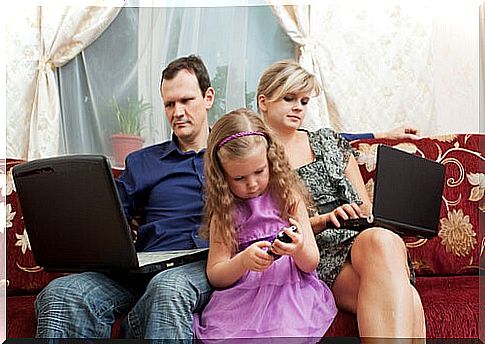The Impact Of Technology On Families

Technology and Family, duel of giants in contemporary society. In modern society, relationships are being made through a click, eye-to-eye conversations, hugs, affection are rare . Words are phrases, words are abbreviations, punctuation is almost non-existent, educational decline. People think that this click helps in what they swear they don’t have today: time, practicality, agility and conformity are part of this race. Children are growing up in a fast-paced world, where time is gold, and living only for now.
The dialogue between parents and children is lagging behind. The most common scene in a home is: the TV is on in the living room, the parents on the sofa, each one touching their cell phone, and the children each in their bedroom, also touching their electronic devices. And for many times this dialogue that should be in person is being digital within the same space.

Who knew that such a small device, an object of measurable value, could be so adored ? Hands are always busy. At mealtime, one hand is for the silverware, as the other hand is for the cell phone, like a mathematical equation, where the order of factors changes the sum, unlike addition.
It is known that it is an excellent and important tool nowadays, however, if not well used, it can cause irreparable damage with regard to family relationships as a whole and also in school education, without dealing with the various fields that it can catch up.
The technology-dependent family suffers impacts on the relationship
Family disorganization can be reached in several fields, whether emotional, social, financial, educational (school), as well as in routine activities, preventing the healthy functioning of the family in the daily life with the risk of damage in the future.
Expressing emotions, making friends, physical exercise, traditional games such as playing ball, tag, stealing the flag, are being replaced by activities in the digital world.
Notably, the main area affected in the relationship between parents and children in the digital age has been dialogue. Today most parents spend most of the day away from home; work consumes them, they arrive home stressed after a day full of professional demands, and when they have time during the day, they communicate with their children through cell phone calls, or the most used Whatsapp.
Early on, children are presented with a technological device with the justification that through this object the parents will have more control over the child for not being able to be close to him.
With multiple tasks, the internet allows and facilitates the acceleration of information, but the human being has limits, and this is becoming a source of stress.
The internet is one of those responsible for behavioral change.
Studies have already come to the conclusion that technology addicts have some of the problems below:
Reduced attention, increased obesity, loss of identity and self-esteem, decreased empathy, increased stress and depression.

But the fault is not of the technology, but of who uses it and how it is done. It is necessary to set limits, determine the frequency of use, and also observe what the child is doing on the internet. Being an adult is “boring”, being a parent and educating takes work, but it is their duty to say “No”, to set limits, guide, prohibit, and make children understand that good parents are not those who allow everything.
Frustrating is also part of education ; frustration allows the understanding that life is not “a bed of roses”, not always everything will work out, not always things go as we wish, the exaggeration of the yes omits the reality that surrounds us. The media can be a fantasy world, and once we get into it, it can be hard to get out.
Humans are becoming more and more individualistic and egocentric, they want to be satisfied with less effort, they are less able to put themselves in the other’s shoes, they cannot perceive and read the emotions of the other, and we still have the inversion of values, where the having is more important than being.
Technologically dependent young people are concerned with the approval of society, the group they live in, because in this world they live in, they think they are not alone. As this is a recent event, we still don’t know what future adults will be like, what the effects of technology on them will be. So we cannot wait sitting down, it is necessary to act before this future society is invaded even more by emotional illnesses.









